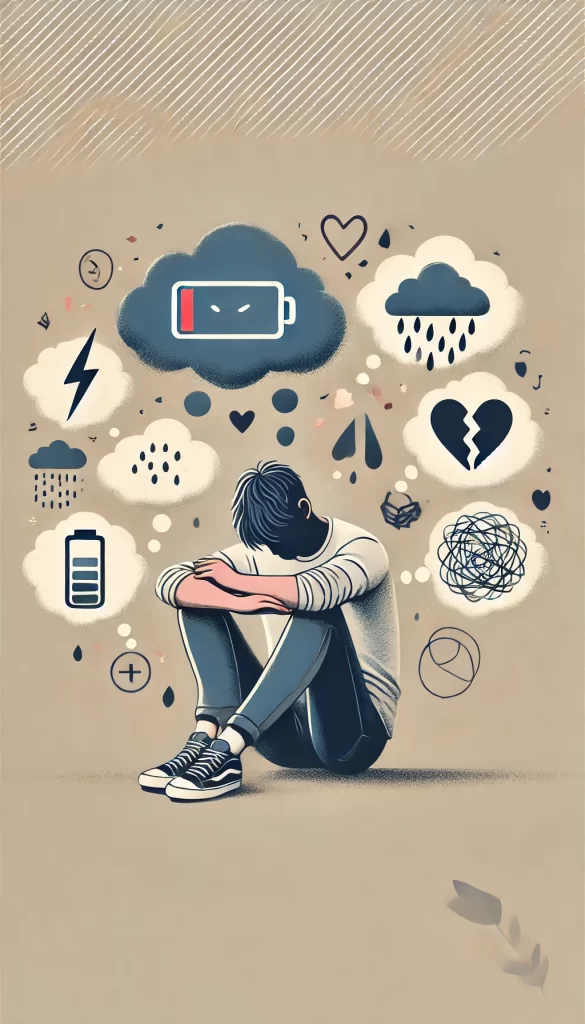Depression Symptoms – A Comprehensive Guide
What is Depression? Common Symptoms
Depression, also known as major depressive disorder, is a mood disorder that significantly impacts your thoughts, feelings, and daily activities. Symptoms can vary, but common signs include:
- Persistent sadness, anxiety, or feelings of emptiness
- Irritability, guilt, or feelings of worthlessness
- Fatigue or low energy levels
- Withdrawal from social interactions and activities
- Loss of interest in previously enjoyed hobbies
- Difficulty focusing, making decisions, or remembering details
- Sleep disturbances (insomnia or oversleeping)
- Changes in appetite or weight
- Thoughts of death or suicide
For a diagnosis of depression, symptoms should last for at least two weeks. Recognizing the signs early and seeking help is crucial for your mental well-being. If left untreated, depression can lead to severe complications, including suicidal ideation and self-harm.
Less Recognized Types and Symptoms of Depression
While some forms of depression are widely recognized, others can be harder to identify. Here are some less common but important variations:
Anger and Irritability in Men
Men may exhibit depression through anger, irritability, or increased substance use. These symptoms often lead to underdiagnosis, as societal norms discourage open discussions about men’s mental health, increasing the risk of severe depression.
High-Functioning Depression
Individuals with high-functioning depression may appear to manage their responsibilities effectively but still experience deep sadness, fatigue, and a lack of motivation. This form of depression often goes undiagnosed due to the ability to “push through” daily tasks.
Seasonal Affective Disorder (SAD)
SAD is characterized by depressive episodes that follow seasonal patterns, typically worsening in the winter months and improving in spring or summer.
Depression Symptoms by Age Demographics
Depression manifests differently across age groups:
- Children: Anxiety, crankiness, school refusal, and fears of parental separation.
- Adolescents: Behavioral issues, irritability, social withdrawal, and academic struggles.
- Adults: Sadness, grief, physical symptoms like chronic pain, and fatigue.
The Importance of a Professional Depression Diagnosis
Accurate diagnosis is essential for effective treatment. Symptoms of depression can overlap with other mental health conditions, such as bipolar disorder, ADHD, chronic fatigue syndrome, and more. A professional assessment ensures appropriate care tailored to your specific needs.
When to Seek Help for Depression
If depression impacts your daily life, it is important to seek treatment immediately. Urgent intervention is necessary if you or someone you know exhibits any of the following signs:
- Suicidal thoughts or behaviors
- Expressions of hopelessness or being trapped
- Reckless actions or a preoccupation with death
- Giving away prized possessions
How Depression is Treated at Sly Academy
Sly Academy offers a range of tailored treatment programs to address depression and other mental health conditions:
Virtual Programs
Flexible virtual intensive outpatient programs (IOP) featuring evidence-based therapies such as Cognitive Behavioral Therapy (CBT) and Dialectical Behavioral Therapy (DBT). Programs are available for all California residents.
Intensive Outpatient Program and Partial Hospitalization Program (IOP/PHP) for Adults and Teens
In-person options provide a structured environment with individual, group, and holistic therapies for comprehensive care.
Residential Programs
For severe depression, our residential programs provide 24/7 care with personalized treatment plans.
Effective Treatments for Depression
Group Therapy
Engage with peers facing similar challenges in a supportive environment to reduce isolation and build community.
Medication Management
Expert psychiatric care to manage symptoms with appropriate medications, such as selective serotonin reuptake inhibitors (SSRIs).







